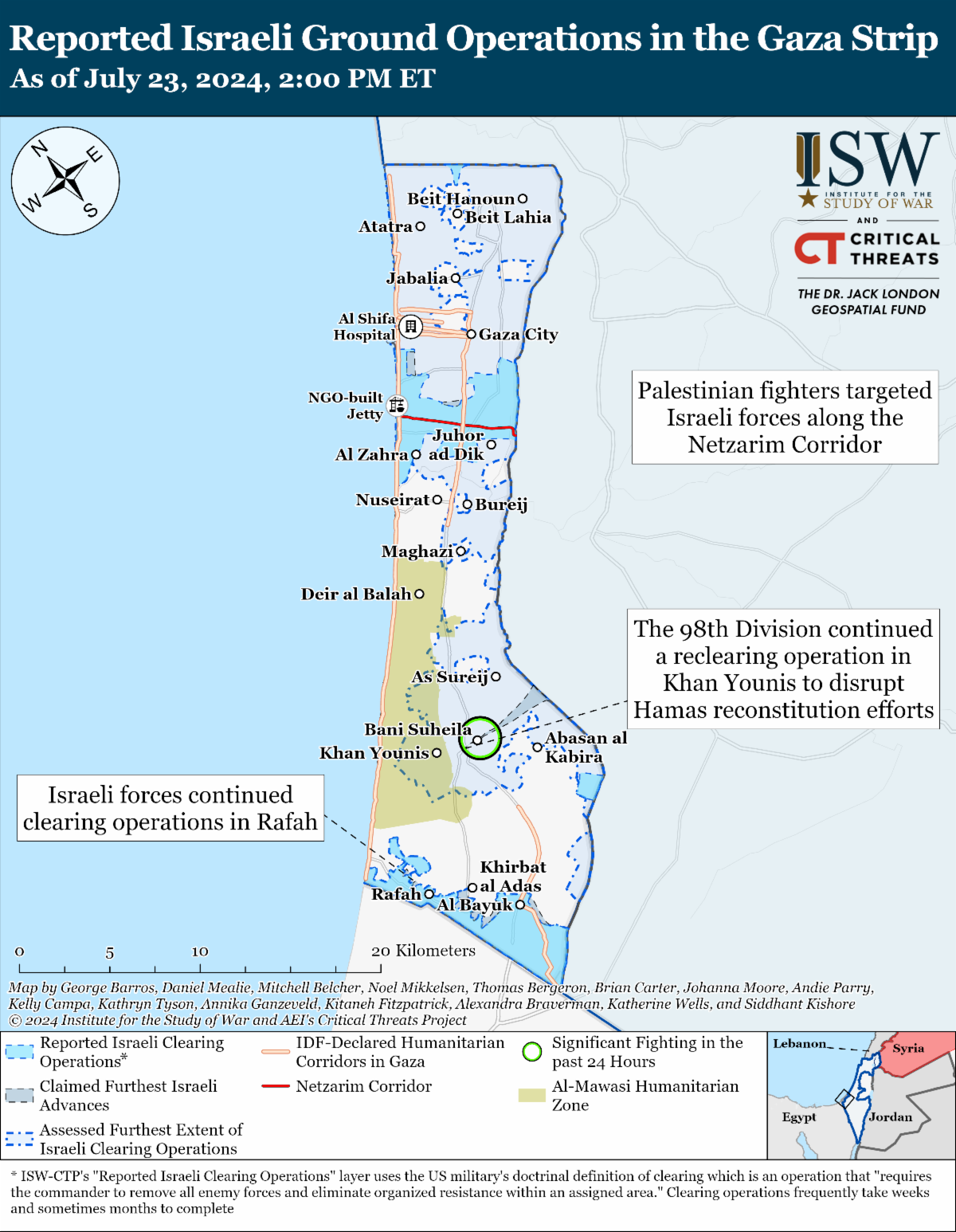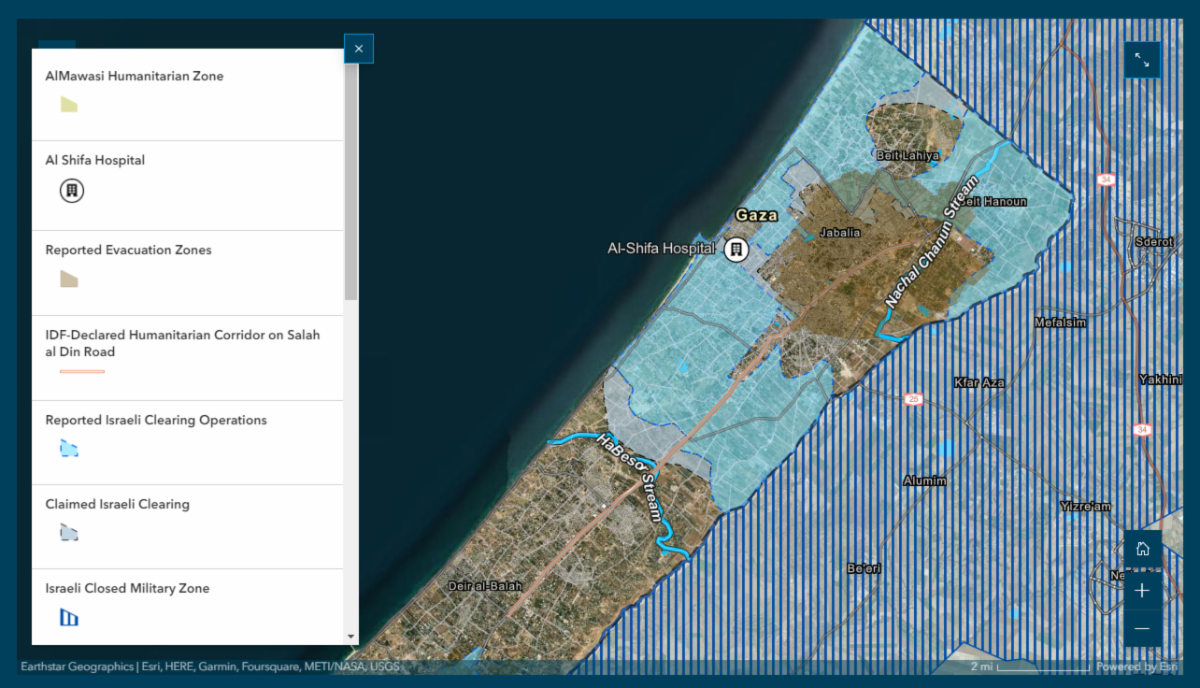Hamas, Fatah and other unspecified Palestinian political factions agreed on a vision for post-war governance of the Gaza Strip on July 23 during “intra-Palestinian reconciliation” talks in Beijing. The factions signed a joint declaration setting out their intention to form “a temporary national unity government” responsible for governing the Gaza Strip and the West Bank. The agreement stipulates that a government partly influenced by Hamas would rule the Gaza Strip and West Bank until elections could be held at an unspecified future date. The declaration reportedly does not address what party maintains security control over the Gaza Strip, and Hamas has been adamant it will keep its military wing. Hamas, Fatah, and China have not disclosed the full text of the declaration at the time of this writing. Senior Hamas official Hossam Badran claimed that unity government would supervise the reconstruction of the Gaza Strip, manage the affairs of the Palestinian people, and provide a “formidable barrier” against regional and international intervention in the governance of the Gaza Strip. Hamas and Fatah have previously signed a series of unimplemented reconciliation agreements. The former Palestinian Authority prime minister and top Fatah official Mohammad Shtayyeh said that Hamas and Fatah must continue discussions to advance the declaration’s framework. CTP-ISW will publish more in-depth analysis and coverage of this development as more details of the agreement become available.
The United States, Israel, and the United Arab Emirates (UAE) are separately advancing an alternative post-war governance vision for the Gaza Strip that conflicts with the Beijing meeting’s vision. Israeli sources said that Emirati Foreign Minister Abdullah Bin Zayed organized a meeting with top US and Israeli officials, including Israeli defense officials responsible for “day-after plans” for the Gaza Strip, on July 18. Abdullah Bin Zayed’s special envoy to the United Nations published a proposal for post-war governance of the Gaza Strip shortly before the meeting and indicated that the UAE could send armed forces to support a multinational “stabilization” mission in the Gaza Strip. The UAE specified that it would only send forces if it was invited by the Palestinian Authority and the United States held a leadership role in the post-war Gaza Strip. Part of the UAE’s plan involves appointing a reformed Palestinian Authority led by an independent prime minister to govern the post-war Gaza Strip. The Palestinian Authority remains most influenced by Fatah, which just signed a unity government declaration with Hamas. The UAE is pushing for non-Fatah officials, such as former Palestinian prime minister Salam Fayyad, to head the government, however.
Four unspecified Iraqi sources cited by Reuters on July 22 claimed that an Iraqi delegation in Washington, DC, has requested the United States begin withdrawing its forces from Iraq starting in September 2024. The unspecified Iraqi sources claimed that the delegation has asked the coalition to begin withdrawing its forces in September 2024 in order to end the International Coalition’s mission in Iraq by September 2025. US and Iraqi officials began talks on July 22 in Washington, DC, to continue negotiations over the end of the International Coalitions mission in Iraq. The United States and Iraq are evaluating a timeline to end the International Coalition’s mission in Iraq based on threats posed by ISIS in Iraq and Iraqi Security Forces (ISF) capabilities to conduct independent counter-ISIS operations.
Key Takeaways: - Gaza Strip: The United States, Israel, and the United Arab Emirates (UAE) are separately advancing an alternative post-war governance vision for the Gaza Strip that conflicts with a separate Chinese-mediated proposal for a unity government between Hamas and Fatah. The US-Israeli-UAE plan could move towards accomplishing Israeli war aims by protecting nascent, non-Hamas alternatives in the Gaza Strip. The Beijing proposal would amount to an Israeli defeat, if implemented.
- Iraq: Four unspecified Iraqi sources cited by Reuters on July 22 claimed that an Iraqi delegation in Washington, DC, has requested the United States begin withdrawing its forces from Iraq starting in September 2024. CTP-ISW continues to assess that the United States and its partners in Iraq and Syria have successfully contained but not defeated ISIS and that a US withdrawal from Syria would very likely cause a rapid ISIS resurgence there within 12 to 24 months that would then spill into Iraq.
- Iran: Iranian Supreme Leader Ali Khamenei gave a speech to Parliament in which he implicitly called on Parliament not to obstruct potential efforts by President-elect Masoud Pezeshkian to resume nuclear negotiations with the West. Khamenei simultaneously encouraged Parliament to work to mitigate the effects of Western sanctions. The pursuit of nuclear negotiations to lift sanctions caused by the nuclear program and an effort to mitigate the effects of sanctions in general are not mutually exclusive.
- Houthi Attacks on Israel: Unspecified military sources in Sanaa told Lebanese newspaper Al Akhbar on July 23 that the Houthis will target new civilian sites in Israel, which is consistent with the Houthi leader’s statements on July 21.
- Houthi Threats Against Saudi Arabia: The Houthis appear to have successfully coerced Saudi Arabia into stopping a Yemeni government effort to cut Houthi access to the international finance system. Saudi Arabia likely pressured the Yemeni government to cancel its decisions to prevent Houthi attacks on Saudi Arabia.
- Lebanon: Lebanese Hezbollah may be expanding the locations it targets in northern Israel. This expansion follows threats by Hezbollah leader Hassan Nasrallah to expand the group’s targets on July 17.
| 






 [ISW] 이스라엘-하마스 전쟁(이란) 업데이트, 2024년 7월 24일
[ISW] 이스라엘-하마스 전쟁(이란) 업데이트, 2024년 7월 24일
 [ISW] 이스라엘-하마스 전쟁(이란) 업데이트, 2024년 7월 22일
[ISW] 이스라엘-하마스 전쟁(이란) 업데이트, 2024년 7월 22일